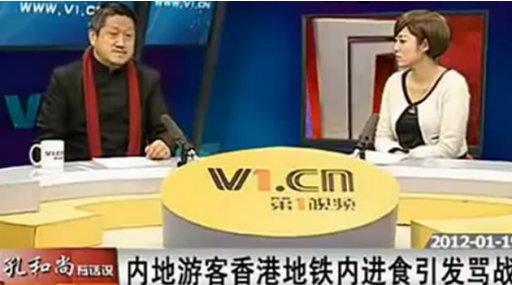A YouTube video last week showed an altercation on Hong Kong's mass transit subway between a mainland family and local commuters. A Beijing TV talk show featured the video, sparking angry denunciation of Hong Kong people as 'dogs' and 'trash' by a university professor.
 |
| Prof Kong's views are widely shared. Northerners historically resent Southerners |
He appeals to the doctrinaire Maoist remnants of the Party and champions Confucian authoritarianism while the rest of China moves on. His continued tenure at prestigious Peking University indicates he enjoys official support for his hardline conservatism.
Rule of law for 'trash' societies
Professor Kong dismissed the rule of law as a colonial mechanism to beat Hong Kong residents. He also slammed Singapore for its laws on smoking. He equated both as inferior people who need to be whipped into correct behaviour. The need for the rule of law is evidence of 'trash' societies.
"Speaking of the rule of law, the British brought it there and let it stay. How did the British deal with these Hong Kong dogs? They gave them a good lashing. They lash them harshly. Today the Beijingers would say that these people f----g deserve a physical lashing."
When the talk show host commented that the environment is cleaner in Hong Kong, the Professor's retort was "Why is it cleaner? Because they rely on rule of law. They do not rely on the quality of the people. Just like in Singapore, you are fined 5,000 dollars for smoking. When you have to resort to the legal system to maintain order, it shows that your people have no quality and no self-consciousness. You won't do what you are supposed to unless you get a beating. This is summarized in one word: Trash."
Eating not allowed on MTR
The regulation forbidding the consumption of food and drink on the MTR is largely followed by Hong Kong commuters. Perhaps the mainland family were not aware of it. Perhaps they chose to ignore it. The eating of the noodles on the train and its spill onto the floor of the carriage provoked the angry exchange. It was captured on a mobile and posted on YouTube.
'Teacher Kong' continued to castigate Hong Kong for being ungrateful and lacking patriotism. "Hong Kong has been returned to China for so long already but their hearts and minds have not returned yet. There are still plenty of running dogs for the colonialists. In front of them they are dogs but in front of mainlanders they are wolves."
Resentment against South has historical roots
The impoverished farmers and fishermen of nineteenth century Guangdong and Fujian provinces ventured out to South East Asian shores and the Americas in search of better lives for themselves and their families. Their descendants over several generations have established successful trading businesses, enjoying freedoms of travel, expression and political participation not yet available in the land of their forefathers.
The imperial rulers in Beijing regarded Southerners traditionally as disloyal and unpatriotic for leaving. The Shanghainese are viewed as too commercially driven. The fortunes and better lives the emigrants built abroad has been a source of friction ever since.
| Sun Yat Sen hung out in HK while pushing to replace Imperial rule |
| CKS declared the rival ROC in Taiwan after losing the fight |
The press and magazines in Guangzhou and Shenzen continue to push the envelop on media commentary about policies and personalities.
Failure to use Putonghua
The Cantonese defeated the British in one way consistently - they refused to use English as the language of the streets through 150 years of colonial rule. In darkest Africa, the English language took root easily under British administrations. The fierce adherence to native dialect and culture continued in Hong Kong under the British and in Guangdong even after the Communist revolution of 1949. Cantonese literature, movies, music and songs continue to thrive locally and abroad as the most successful linguistic creative export to the diaspora.
The Central government in the mid-80s from sheer frustration, denounced "the 50 million laggards in the South who refuse to speak Putonghua." Cantonese enthusiasts on the other hand argue that it is the closest dialect to Tang dynasty Chinese, still retaining ancient Chinese expressions, while the seat of power in the north has been heavily influenced by Mongol rule, culture and language.
Mainland births to secure Hong Kong residency
There is continuing resentment about mainland women using loopholes in Hong Kong's immigration processes to gain residency rights for babies born in local hospitals. That surge has displaced many Hong Kong mothers from access to maternity facilities at public hospitals.
 |
| HK women are impatient with the foot-dragging on immigration policy and controls |
There is political pressure to seek another "interpretation and change of the Basic Law" to bar mainland babies from the residency qualification. The Hong Kong administration is reluctant to hot-foot to Beijing for 're-interpretations' which would tatter the already fragile Basic Law. They are seeking cross-border co-operation to stop the middlemen and to remove the abuse of the existing channels for agreed mainland immigration quotas.
It says more than all Professor Kong's denunciations of Hong Kong, when mainland mothers risk their lives and that of their unborn babies, to secure their children a better future in the HKSAR.
ENDS
Dear MC, That is fine. Thanks CP
ReplyDelete